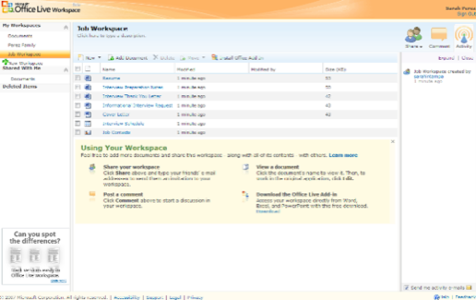The latest ReadWriteTalk podcast is up and it’s a chat with Eric Gilmore, Senior Product Manager for Office Live at Microsoft. In particular Eric talks about Office Live Workspace, a free web-based extension of Microsoft Office that lets you access your documents online and share your work with others. Our own Sarah Perez recently compared Office Live Workspace to Google Docs. In the podcast, Sean Ammirati questioned Eric about that comparison…

Sarah concluded that “Office Live Workspace […] may not have the collaboration features of Google Docs, but the workspaces feature is unique. Plus, you have the capabilities of full-featured Office software available (assuming you own it)!”. In response, Eric replied that “fundamentally, our approach is quite different than […] Google.” Specifically he said that Microsoft’s approach is to “bridge the gap” between rich client applications on your desktop and the Web. Their strategy is all about providing “the best experience no matter if its on your phone, on the desktop, or on the Web.” He takes a slight shot at Google when he mentions the scale that Microsoft can achieve in office software:
“You know, you look at some traction that some of our competitors have gotten. Its quite small. Its quite niche. And I think one of the advantages I think Microsoft brings on the table is how can we scale this kind of capability to millions and millions of people. And Office Live Workspace is really the first service thats in this area. And youre going to see us, which weve already showed, is were going to rapidly improve it.”

Eric Gilmore also clarified the confusion around the Microsoft Live brand:
“When we think of Live, its all user managed. So the content is all about me. All the services is, kind of, I control — my company or my organization I work for really dont control live services. Thats kind of the piece thats important. And typically, live services today are free, so theyre free online so they can take advantage of that.”
emphasis ours
This is an interesting point, becase traditionally Microsoft Office has been a system controlled by the IT department and CIOs. With Office Live Workspace, contends Gilmore, much of the control goes back to the user. So the question becomes: how are CIOs and the IT department dealing with that? I thought Gilmore’s response to this was especially revealing about Microsoft’s Office Live strategy:
“Well, I talk a lot to CIOs and other businesspeople and enterprises.
And I think theyre really grappling with trendy term of consumerization of IT. Theyre seeing this kind of wave of really innovative Web 2.0 application sinking into the enterprise. And quite frankly, theyre struggling with how to deal with them. Do they embrace them? Do they shut them down? And I think there are significant challenges they have to deal with: Security, privacy, manageability, a lot of the core things that IT professionals care about.
When we look at the problem they have to deal with, a lot of times, we get the question, “Do you guys support Workspace being in the enterprise?” And I absolutely respond, “We love it. We hope people use it.” If it goes in the enterprise, its a great thing because typically its solving frustration or pain for those employees. And today, a CIO and IT pro have to deal with consumer email being the biggest leak in information outside the firewall.
And we look at Workspace as providing a great collab experience, whether its ad hoc collaboration or not, if you dont have something like SharePoint where there is a lot of that security and privacy manageability aspects to the infrastructure. So we think its a bridging aspect. Its better than email. We think its a great ad hoc collaboration. Its free.“
emphasis ours
Eric concludes that longer term, Microsoft sees Office Live Workspace as “a way to bridge the gap between the Live ID world and the Active Directory world.”
Conclusion
Perhaps what it comes down to, when comparing Microsoft Office Live Workspace with Google Docs, is this: Microsoft sees its product as a ‘lite’ version of SharePoint; whereas Google, despite its past protestations that it aims to complement Microsoft Office and not replace it, is very much about routing around the need for big bulky desktop apps like MS Office and SharePoint.

The word “bridging” or “bridge” was used a few times in the podcast, which to me indicates that Office Live Workspace is just as much about enticing customers to ‘upgrade’ to the desktop experience (MS Office, SharePoint) than it is about bringing the Web to MS Office users. This is an entirely valid strategy, but it still means that Microsoft’s entire office strategy depends on desktop software.
That leaves the door ajar for the likes of Google and Zoho to take market share from MS Office, over time, by providing a completely ‘web native’ approach.
Check out the full podcast with Eric Gilmore of Microsoft on ReadWriteTalk.

















